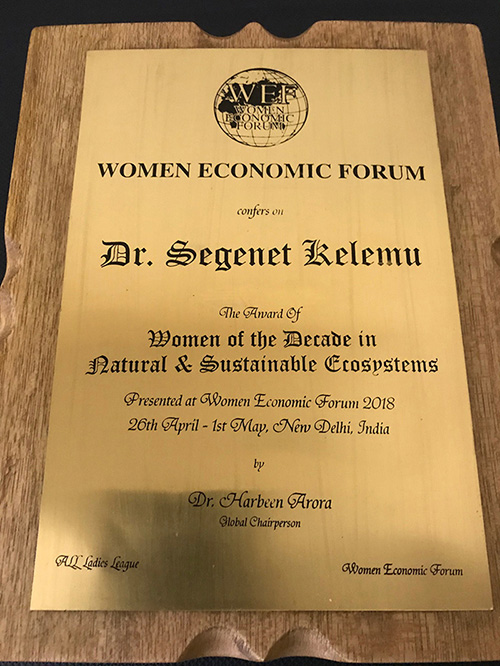icipe Director General honoured
Dr Segenet Kelemu among recipients of the Women Economic Forum’s highest recognition, Women of the Decade Award
New Delhi, India, 26 April – 1 May 2018: Dr Segenet Kelemu, the Director General of the International Centre of Insect Physiology and Ecology (icipe), is among the recipients of the 2018 Women of the Decade award, the highest recognition conferred by the Women Economic Forum (WEF). A global conference of the ALL Ladies League (ALL), WEF is the largest women chamber in the world, with about 70,000 members in 150 countries.
Dr Kelemu received the award in the Natural and Sustainable Ecosystems category at this year’s WEF event, held under the theme: The Economics of Goodness: Empoweringg Potential, Engineering Change.
 In a heartfelt speech delivered to over 2000 people from across the globe, Dr Kelemu spoke about her journey from rural Ethiopia, to graduate studies in the United States, and 15 years at the International Center for Tropical Agriculture (CIAT), Colombia, first as a Senior Scientist, and later Leader of Crop and Agroecosystem Health Management.
In a heartfelt speech delivered to over 2000 people from across the globe, Dr Kelemu spoke about her journey from rural Ethiopia, to graduate studies in the United States, and 15 years at the International Center for Tropical Agriculture (CIAT), Colombia, first as a Senior Scientist, and later Leader of Crop and Agroecosystem Health Management.
She emphasised: her upbringing, mentorship and support of family and community; vast experience of the challenges and successes associated with agricultural research; colleagues, mentors and mentees; and global research partners, as the key factors that have shaped her career and professional growth, and vision for science-led development in Africa.
“As a scientist and a scientific leader, my dream has always been to assist in the building of an excellent world-class research capacity in developing countries, and in particular in Africa, where such competence is most urgently needed,” Dr Kelemu said.
“This recognition, and its title, Women of the Decade Award, presents a chance to retrospect on my contribution towards this goal over the past 10 years; a significant period for the continent,” she added noting that in August 2007, after 25 years away, she decided to return to Africa, to find a continent at crossroads, emerging from years of economic distress to remarkable growth.
Between 2007 and 2012, as the Director of the Biosciences eastern and central Africa (BecA) Hub, based in Nairobi, Kenya, Dr Kelemu played a role in changing the face of African biosciences, opening up new possibilities for addressing agricultural constraints.
After almost a year as Vice President of programs at the Alliance for a Green Revolution in Africa ( AGRA), Dr Kelemu took over the leadership of icipe in 2013, the only international institution in Africa working primarily on insects and related arthropods, and a globally recognised centre of excellence in this field.
“icipe is an institution that I believe to strongly epitomise my vision. The Centre embodies the idea of excellence in its truest form; adhering to the highest international standards of science while responding to critical developmental needs facing the continent. As such over the past five years I have been able to advance my own ideals, and those of the Centre, in mainstream the role of science and technology in process of change in Africa,” noted Dr Kelemu.
For close to 50 years, icipe has maintained a commitment to producing world-class knowledge towards developing and disseminating environmentally friendly, accessible, affordable and easy-to-use solutions for communities most in need. icipe delivers its goals through four thematic areas: human health, animal health, plant health and environmental health.
The synergies between these four themes present a unique framework to tackle the interlinked problems of poverty, poor health, low agricultural productivity and environmental degradation in a comprehensive manner. The four themes approach also provides a platform to build the capacity and leadership of African scientists in a cross-cutting manner while facilitating collaboration with hundreds of researchers and partners across Africa and the world.
Ultimately, icipe’s unique approach enables the effective transfer of technologies and strategies to end-users, thereby improving millions of lives in the continent. In addition, icipe receives up to 180 graduate students annually (working with 43 universities across Africa and elsewhere) who are incorporated into the Centre’s research programmes, thus nurturing generations of highly trained scientists for the continent’s development.
Notes for Editors
The International Centre of Insect Physiology and Ecology: Our mission is to help alleviate poverty, ensure food security, and improve the overall health status of peoples of the tropics, by developing and disseminating management tools and strategies for harmful and useful arthropods, while preserving the natural resource base through research and capacity building. icipe gratefully acknowledges the financial support of the following core donors: Swiss Agency for Development and Cooperation (SDC); Swedish International Development Cooperation Agency (Sida); UK Aid, from the government of the United Kingdom; the Ministry of Higher Education, Science and Technology, Kenya; and the Government of the Federal Democratic Republic of Ethiopia. In addition, icipe receives restricted project funding from a range of institutions from across the world, among them, governments, private foundations and United Nations agencies. icipe also benefits from extensive partnerships with research collaborators (including universities and research institutes in Africa and beyond), private sector partners, and communities across Africa. A comprehensive list of icipe donors and partners is available at: http://www.icipe.org/donors-and-partners. For further information on icipe visit: www.icipe.org.
For further information on Dr Segenet Kelemu: https://en.wikipedia.org/wiki/Segenet_Kelemu
For further information on the World Economic Forum, Women of the Decade award: http://wefawards.org/category/women-of-the-decade/
Media Contacts: Liz Ng’ang’a – Lnganga@icipe.org

